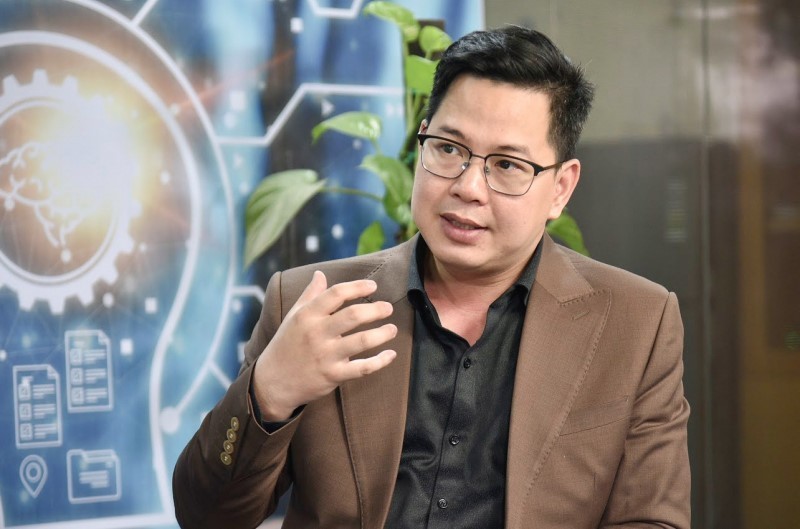
Plan for 2025 High school graduation exam approaches closer to international practice: Scholar
Latest
 |
| High school graduation exams approaches closer to international practice: Associate Professor. Dr. Tran Thanh Nam, Vice Principal of the University of Education, Hanoi National University. (Photo: Courtesy) |
That is the opinion of Associate Professor. Dr. Tran Thanh Nam, Vice Principal of the Institute of Education, Vietnam National University, Hanoi, refered to the high school graduation exam plan from 2025 that the Ministry of Education and Training has recently announced.
How do you evaluate the plan to organize the 2025 high school graduation exam that the Ministry of Education and Training just announced?
Personally, I see many new and positive points in the high school graduation exam plan from 2025 that the Ministry of Education and Training recently announced. It is consistent with the philosophy of student-centered learning, respecting the development of multiple intelligences, in line with the requirements for comprehensive fundamental innovation in education and training, and meeting the needs of international integration.
Accordingly, candidates must take two compulsory subjects, including: Literature, Mathematics and two elective subjects from the remaining subjects learned in Grade 12, including: Foreign Language, History, Physics, Chemistry, Biology, Geography, Economic and legal education, Informatics, Technology.
The difference, though small but meaningful, is that the exam has a learner-centered orientation. Previously, all exam subjects were selected by the State, and students were forced to take those subjects regardless of career orientation. From 2025, students must take two subjects that represent the most basic thinking abilities of an adult: quantitative thinking ability (mathematics) and qualitative linguistic thinking ability (literature) and have the right to choose 2 subjects according to theirs interests, abilities, and career orientation to enroll in colleges or universities.
Using the 2+2 exam method has also changed the concept of traditional exam blocks, such as there is no longer a combination of Natural Sciences or Social Sciences subjects. However, this may be consistent with the fact that many new professions have emerged in the labor market and the new training programs that educational institutions have been building are "trans-disciplinary" in combination of both natural and social sciences and technology.
With four exam subjects, including two mandatory subjects and two optional subjects, the number of combinations of exam subjects is 36, a decrease of one/ third compared to the current number of admission combinations. This will help simplify the college admission process later on.
The small number of exam subjects also helps society save money. Students being able to choose exam subjects will help reduce stress for candidates and avoid the situation of only studying for the exam but instead studying for the desire to discover knowledge of the children.
With reference to other countries in the world, how do they take the High School graduation exam? What can we learn?
Each country has its own policies to evaluate students' knowledge, abilities, and qualities to see if they are qualified to study at a higher level such as university. Basically, they often use two basic methods: standardized competency assessment tests (such as SAT and ACT) and school-based assessments or a combination.
In particular, standardized large-scale assessment tests such as SAT and ACT mainly assess reading comprehension skills, essay writing skills and mathematical logical thinking skills. The adjustment of two required subjects which are Mathematics and Literature has also approached the core competencies that need to be assessed in students from the large-scale assessment tests that many countries are using.
As for graduation exam subjects, countries like China, Republic of Korea, and Japan will test Chinese, Korean, Japanese and a combination of other subjects such as Math, English, and one subject on Sciences or Social Sciences and Humanities.
As for some countries in the European Union (EU) such as France (with the Bac exam), students can choose to take one of three Bac categories: S (Science), ES (Socioeconomics) and L (Arts and Culture). On other case, the Abitur graduation exam system in Germany includes compulsory subjects of Literature and Mathematics with specialized subjects according to students' interests as Physics, Chemistry, Biology, History, Geography, Foreign Languages, and many more.
Thus, the plan for the 2025 exam has basically been approached the plans for organizing graduation exams of other countries, including mandatory subjects which assess core competencies such as linguistic thinking (reading comprehension and essay writing) and logical-quantitative thinking (Mathematics).
As taking exams cause too much trauma and psychological pressure on students, and doesn't accurately measure the abilities and qualities of learners. Therefore, recently, university admission is not only based on exam scores but also combines and places more weight on direct competency interviews and review of the learning process through school records.
Exams also focus not only on assessing academic knowledge but also on competencies and soft skills such as ambition, flexible adaptability, leadership, and teamwork, problem solving and impressive communication. Those are the things we need to continue to implement effectively.
I think one of the most arguable issue is the non-compulsory foreign language exam. From practice of other countries around the world, it shows that some countries consider foreign languages as a compulsory subject (even designating the compulsory foreign language as English) and some other countries do not. This is something that needs further consideration.
If we use the Foreign Language option as a mandatory subject, we can even require it to be English because English is now the mass language in business, science, and technology programming, an important tool for individuals to connect with the rest of the world, preparing to integrate well into the professional world later. If we value critical thinking, mandatory foreign language requirements are also a way to practice communication skills and improve critical thinking capacity (learning to think in a new language).
 |
| Plan for 2025 High school graduation exam approaches closer to international practice: Students in the high school graduation exam.(Photo: Thanhnien.vn) |
However, we must also take into consideration of Vietnam's specific situation as there are many students in remote areas, or ethnic students whose Kinh language is not their mother tongue. If we make foreign language as compulsory exam, this choice could cause inequality among students from advantaged areas and disadvantaged areas.
Nowaday, the results of the high school graduation exam provide data for university admission and vocational education, but do not play a direct role in admission. What is your opinion?
What we need to change is to value learning process, not only exams. Students need to be motivated for discovering knowledge, having passion for learning to conquer new things in your professional field, but not study to please your family and teachers.
Therefore, exams or tests need to be seen as an opportunity to review learners' knowledge and abilities to make appropriate adjustments, helping themselves achieve their career goals and succeed in the future. not because of fear of failure.
The new general education program needs to portray the necessary competencies and qualities for a high school graduate to have, and be evaluated on subjects to reflect all the competencies and qualities that need to be achieved.
In your opinion, what are the important criteria of human resources to meet the country's socio-economic development?
Economic and social development requires a high-quality human resource, not only mastering knowledge but also having many very important qualities, such as the capabilities of 21st century citizens, the ability to creativity, adaptability and flexible problem solving, critical thinking, ambition and desire to contribute to community or society. These quality competencies also need to be included in the system for comprehensive assessment, reflecting students' abilities and preparation for their later studies and careers.













